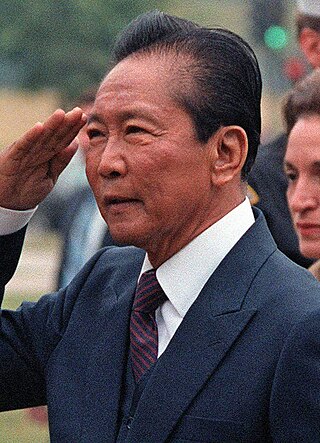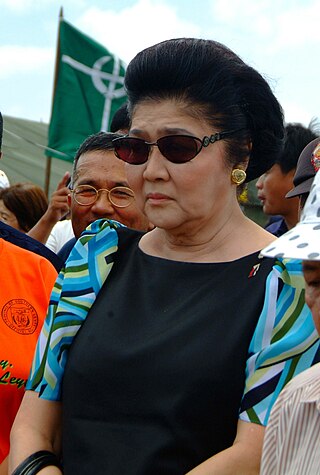
Ferdinand Emmanuel Edralin Marcos Sr. was a Filipino politician, lawyer, dictator, and kleptocrat who served as the tenth president of the Philippines from 1965 to 1986. He ruled under martial law from 1972 until 1981 and kept most of his martial law powers until he was deposed in 1986, branding his rule as "constitutional authoritarianism" under his Kilusang Bagong Lipunan. One of the most controversial leaders of the 20th century, Marcos's rule was infamous for its corruption, extravagance, and brutality.

Imelda Romualdez Marcos is a Filipino politician who was First Lady of the Philippines from 1965 to 1986, wielding significant political power after her husband Ferdinand Marcos placed the country under martial law in September 1972. She is the mother of current president Bongbong Marcos.
Raymond Bonner is an American lawyer, journalist, author and bookstore owner. He has been a staff writer at The New York Times, The New Yorker and has contributed to The New York Review of Books; received an Emmy for a documentary he produced with Alex Gibney about the CIA's torture program for 9/11 suspects. He now an owner of a bookstore, Bookoccino, in Sydney, Australia.

Martial law in the Philippines refers to the various historical instances in which the Philippine head of state placed all or part of the country under military control—most prominently during the administration of Ferdinand Marcos, but also during the Philippines' colonial period, during the second world war, and more recently on the island of Mindanao during the administrations of Gloria Macapagal Arroyo and Rodrigo Duterte. The alternative term "martial law era" as applied to the Philippines is typically used to describe the Marcos martial law period specifically.
Bernardo Malvar Villegas is a Filipino economist and writer best known for being one of the framers of the 1987 Philippine Constitution, for authoring a number of widely used Philippine economics textbooks, and for his role in the founding of two influential Philippine business organizations, the Center for Research and Communication and the Makati Business Club.
The Presidential Commission on Good Government (PCGG) is a quasi-judicial government agency of the Philippines whose primary mandate is to recover the ill-gotten wealth accumulated by Ferdinand Marcos, his immediate family, relatives, subordinates and close associates, whether located in the Philippines or abroad. It was created by President Corazon Aquino shortly after she was sworn in as president in the aftermath of the 1986 People Power revolution. In addition to recovering the Marcos wealth, it is also tasked with investigating other cases of graft and corruption; and instituting of corruption prevention measures.

The third inauguration of Ferdinand E. Marcos as the tenth president of the Philippines and that saw Ferdinand Marcos inaugurated for the third time took place on June 30, 1981, at the Quirino Grandstand in Manila, making it the first Philippine presidential inauguration to take place on June 30. The oath of office was administered by Chief Justice of the Supreme Court of the Philippines Enrique Fernando. The inauguration had then U.S. Vice President George H. W. Bush, Singaporean Prime Minister Lee Kuan Yew, future President of China Yang Shangkun and Thai Prime Minister Prem Tinsulanonda in attendance. This is when Bush made the infamous praise for Marcos: "We love your adherence to democratic principles and to the democratic process." The inauguration ceremonies started at 6:50 AM PST (GMT+8) to avoid the heat and afternoon rains. The inauguration was also televised live.

The Solid North refers to the regional voting bloc of the northern provinces of the Philippines for politicians of Ilocano descent, more particularly the Marcos family and their allies, and also economic issues affecting the Ilocanos in general such as the tobacco industry. Often included in Solid North are the provinces in the Ilocos Region, Cordillera Administrative Region (CAR), and Cagayan Valley.
The Marcos Japanese ODA Scandal, referred to in Japan simply as the Marukosu giwaku (マルコス疑惑), or "Marcos scandal", refers to incidents of alleged corruption linked to Japanese Official Development Assistance (ODA) to the Philippines during Philippine president Ferdinand Marcos' administration.

The bust of Ferdinand Marcos along the Aspiras–Palispis Highway in Tuba, Benguet, Philippines, was a 30-meter (98 ft) concrete monument of former Philippine President, dictator and kleptocrat Ferdinand Marcos. The monument became a subject of controversy as its construction displaced indigenous Ibaloi residents in the sparsely populated area, and Ibaloi residents were reportedly forced to sell their ancestral land at very low prices. The monument was destroyed in December 2002, with the New People's Army, the armed wing of the Communist Party of the Philippines, taking credit for its destruction.
Aimee Romualdez Marcos-Bernedo is a Filipina musician and public figure known as the drummer of indie music band The Dorques. She is the adopted daughter of the late former Philippine President Ferdinand Marcos and former first lady Imelda Marcos.

The burial of Ferdinand Marcos, a former Philippine President who ruled as a dictator for 21 years, took place on November 18, 2016, at the Libingan ng mga Bayani in Fort Bonifacio, Metro Manila, Philippines. Marcos had been elected the 10th President of the Philippines in 1965, but declared Martial Law in 1972 before his final constitutionally allowed term was over, holding on to power until his overthrow by the People Power Revolution in 1986.

Antonio Floirendo, Sr. was a Filipino entrepreneur and landowner whose main business was his 6000-hectare banana plantation in Panabo, Davao del Norte, Philippines, earning him the title as the "banana king" during the dictatorship of Ferdinand Marcos. He was among a group of close associates of Philippine President Ferdinand Marcos referred to in media as "Marcos cronies", having benefitted from his close association with Marcos. The Marcos mansion at 2442 Makiki Heights Drive in Honolulu, Hawaii, in which Marcos spent the last years of his life in exile, was registered under the name of Floirendo Sr.

At 7:15 p.m. on September 23, 1972, President Ferdinand Marcos announced on television that he had placed the entirety of the Philippines under martial law. This marked the beginning of a fourteen-year period of one-man rule that would effectively last until Marcos was exiled from the country on February 25, 1986. Even though the formal document proclaiming martial law—Proclamation No. 1081, which was dated September 21, 1972—was formally lifted on January 17, 1981, Marcos retained essentially all of his powers as dictator until he was ousted.

The Philippine Constitutional Convention of 1971 was called to change the 1935 Constitution of the Philippines. The delegates were elected on November 10, 1970, and the convention itself was convened on June 1, 1971. It was marked by controversies, including efforts to uphold term limits for incumbent President Ferdinand Marcos, and a bribery scandal in which 14 people, including First Lady Imelda Marcos, were accused of bribing delegates to favor the Marcoses.
Jose Yao Campos, also known by his Chinese name Yao Cho Liat, was a Filipino businessman best known as the founder of the United Laboratories (Unilab). He became an early supporter of Philippine president Ferdinand Marcos, who tapped him as a "financial advisor." In 1986, the Presidential Commission on Good Government (PCGG) cited him for having served as a "front man" for various "ill-gotten" wealth, including $52.5 million of real estate representing the most prominent Marcos Mansions. He became the first of the Marcos cronies to make a deal with the PCGG in exchange for immunity from suit. By the time he died in 2006, his family had become one of the Philippines' most powerful business clans, with Unilab helmed by his firstborn, Joy Campos Hess and her son, Clinton Hess. His eldest son Joselito Campos founded the food company NutriAsia and acquired in Del Monte Philippines and Del Monte Pacific; and his youngest child Jeffrey Campos running Greenfields Development Corporation.
The Campaign Against the Return of the Marcoses and Martial Law (Carmma) is a Philippines-based coalition of victims under President Ferdinand Marcos' martial law. It was launched on February 4, 2016. The group is composed of martial law victims, civil libertarians, peace and freedom advocates, and militant groups. It has campaigned against the return to power of the family of Philippine dictator Ferdinand Marcos. It has also called for a review of history textbooks that seek to revise history and rehabilitate the Marcoses' image. The Marcoses have been accused of plunder and human rights abuses, while Imelda Marcos has been convicted of seven counts of graft. Bongbong Marcos ran for vice president and lost to Leni Robredo in 2016. Imee Marcos won a seat in the Senate in 2019.

The overseas landholdings of the Marcos family, which the Philippine government and the United Nations System's Stolen Asset Recovery Initiative consider part of the $5 billion to $13 billion "ill-gotten wealth" of Ferdinand and Imelda Marcos, are said to be distributed worldwide in places including California, Washington, New York, Rome, Vienna, Australia, Antilles, the Netherlands, Hong Kong, Switzerland and Singapore. These are aside from the fifty-or-so Marcos mansions acquired by the Marcos family within the Philippines itself.

The Marcos family, a political family in the Philippines, owns various assets that Philippine courts have determined to have been acquired through illicit means during the presidency of Ferdinand Marcos from 1965–1986. These assets are referred to using several terms, including "ill-gotten wealth" and "unexplained wealth," while some authors such as Belinda Aquino and Philippine Senator Jovito Salonga more bluntly refer to it as the "Marcos Plunder".
The alleged September 22, 1972, ambush attack on the then-Defense Minister of the Philippines Juan Ponce Enrile is a disputed incident in which Enrile's white Mercedes-Benz sedan was ambushed near the upscale Wack Wack village in Mandaluyong, Metro Manila. It was cited by President Ferdinand Marcos as the proximate incident which led to the announcement of Marcos' declaration of martial law the following day, although Marcos would later claim that he signed the formal proclamation of martial law on September 21, the day before the Enrile ambush.











